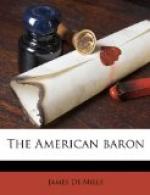The Baron thus enjoyed himself in a large, exuberant fashion, and monopolized the conversation in a large, exuberant way. He outdid himself. He confided to the ladies his plans for the regeneration of the Roman Church and the Roman State. He told stories of his adventures in the Rocky Mountains. He mentioned the state of his finances, and his prospects for the future. He was as open, as free, and as communicative as if he had been at home, with fond sisters and admiring brothers around him. The ladies were disgusted at it all; and by the ladies I mean only Mrs. Willoughby and Lady Dalrymple. For Minnie was not—she actually listened in delight. It was not conventional. Very well. Neither was the Baron. And for that matter, neither was she. He was a child of nature. So was she. His rudeness, his aggressiveness, his noise, his talkativeness, his egotism, his confidences about himself—all these did not make him so very disagreeable to her as to her sister and aunt.
So Minnie treated the Baron with the utmost complaisance, and Hawbury was surprised, and Mrs. Willoughby and Lady Dalrymple were disgusted; but the Baron was delighted, and his soul was filled with perfect joy. Too soon for him was this drive over. But the end came, and they reached the hotel. Hawbury left them, but the Baron lingered. The spot was too sweet, the charm too dear—he could not tear himself away.
In fact, he actually followed the ladies into the house.
“I think I’ll just make myself comfortable in here, Min, till you come down,” said the Baron. And with these words he walked into the reception-room, where he selected a place on a sofa, and composed himself to wait patiently for Minnie to come down.
So he waited, and waited, and waited—but Minnie did not come. At last he grew impatient. He walked out, and up the stairs, and listened.
He heard ladies’ voices.
He spoke.
"Min!"
No answer.
“MIN!” louder.
No answer.
“MIN! HALLO-O-O-O!”
No answer.
"MIN!" a perfect shout.
At this a door was opened violently, and Mrs. Willoughby walked out. Her cheeks were flushed, and her eyes glanced fire.
“Sir,” she said, “this is intolerable! You must be intoxicated. Go away at once, or I shall certainly have you turned out of the house.”
And saying this she went back, shut the door, and locked it.
The Baron was thunder-struck. He had never been treated so in his life. He was cut to the heart. His feelings were deeply wounded.
“Darn it!” he muttered. “What’s all this for? I ain’t been doing any thing.”
He walked out very thoughtfully. He couldn’t understand it at all. He was troubled for some time. But at last his buoyant spirit rose superior to this temporary depression. To-morrow would explain all, he thought. Yes, to-morrow would make it all right. To-morrow he would see Min, and get her to tell him what in thunder the row was. She’d have to tell, for he could never find out. So he made up his mind to keep his soul in patience.




